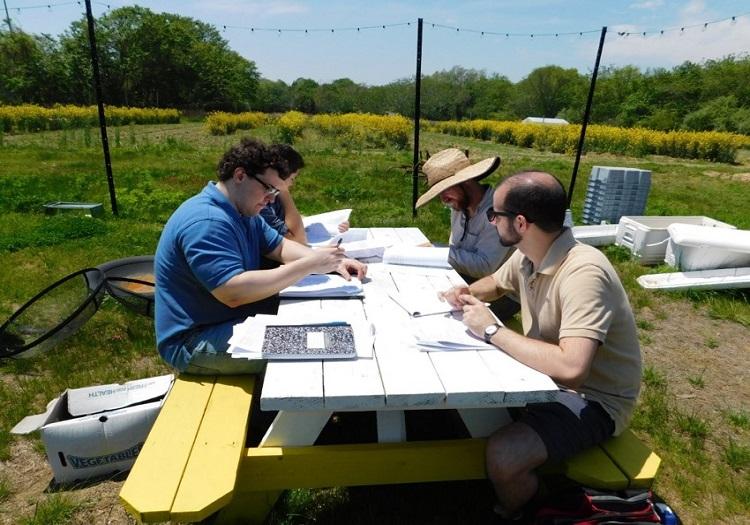Food Law Leaders Join the Farm Bill Fray

New reports tout a fair deal for farmers, food insecure families, and the environment
Three reports out today from the Farm Bill Law Enterprise (FBLE) apply a justice lens to the farm bill debate underway on Capitol Hill.
The reports are the product of a novel partnership between eight law school programs, including the Elisabeth Haub School of Law at Pace University. FBLE’s reports coincide with the imminent release of draft farm bills in the House and Senate, which Congressional observers anticipate next month.
In addition to Pace University Elisabeth Haub School of Law Food Law Initiative, FBLE members include: Duke Law School Environmental Law & Policy Clinic; Harvard Law School Environmental Policy Initiative and Emmett Environmental Law and Policy Clinic; Harvard Law School Food Law and Policy Clinic; Harvard Law School Health Law and Policy Clinic; UCLA School of Law Resnick Program for Food Law and Policy; Vermont Law School Center for Agriculture and Food Systems; and Yale Law School Environmental Protection Clinic.
By combining expertise in food, public health, and environmental law, FBLE is the first effort of its kind.
New farm bills happen only every five years. The current farm bill expires in September, and if Congress does not act by that deadline many important programs will perish.
“The farm bill is the most important piece of legislation affecting our food and farming system,” says Emily Broad Leib, Director of the Harvard Law School Food Law and Policy Clinic and an author on FBLE’s reports. “My colleagues and I decided to invest the time working together to address this legislation because it’s so vital to justice in the food system.”
In addition to members programs, FBLE recruited law students from across the country to work on the project. In 2016, the newly formed FBLE dove into collaborative research. Together, faculty and students analyzed each of the farm bill’s components, research that is available on the FBLE website.
This research helped FBLE members develop shared goals for a farm bill that meets the long-term needs of our society. These goals include a reliable and nutritious food supply, an honest living for farmers, a healthy environment, and a strong safety net against hunger.
FBLE’s reports make recommendations for how the next farm bill can begin to meet those goals by maintaining key programs that work, adding new programs, and redistributing funding in ways that are better for health, the environment and justice.
Each report focuses on a specific theme: Diversified Agricultural Economies; Food Access, Nutrition and Public Health; and Productivity and Risk Management. Please see the attached one-pager for a summary of each report.
FBLE expects its reports will convince more people to get involved. The reports can be found at www.FarmBillLaw.org, which will also track the bill’s progress over the coming months.
“The farm bill affects all of our lives,” says Margot Pollans, a Haub Law professor and author on one of FBLE’s reports. “These reports serve as a user manual for anyone who wants to understand its significance and its potential as a tool in the quest for a just and sustainable food system.”
###
For almost four decades, the Pace Environmental Law Program has provided an internationally acclaimed environmental legal education. Founded in 2015 as part of the Environmental Law Program, the Food Law Initiative (FLI) seeks to promote a just and sustainable food system by increasing access to legal services for farmers, food businesses, and food justice NGOs. FLI trains students and provides services through its Food and Beverage Law Clinic, and it engages in a variety of food law education initiatives. For more information, visit http://law.pace.edu/environment.
Summary of FBLE Report Goals
Diversified Agricultural Economies
Diversified Agricultural Economies addresses the barriers facing small, medium-scale, diversified, beginning, female, and minority farmers and ranchers. It sets goals and makes recommendations to create opportunities for these producers by improving access to markets, insurance, credit, and land.
- Goal I: Enhance market opportunities for small- and mid-size operations, beginning farmers and ranchers, specialty crop producers, and independent meat producers, thereby also increasing consumer access to diverse sources of food.
- Goal II: Expand whole-farm insurance for diversified farms
- Goal III: Improve access to credit for socially disadvantaged and beginning farmers and ranchers
- Goal IV: Accelerate land ownership for socially disadvantaged and beginning farmers and ranchers
Food Access, Nutrition and Public Health
Food Access, Nutrition, and Public Health focuses on the farm bill’s nutrition safety net for low-income families, the elderly, people living with disabilities, and unemployed Americans. It sets goals and makes recommendations to improve food access, nutrition, public health, infrastructure, and economic development.
- Goal I: Protect and Strengthen SNAP as our Nation’s Most Vital and Successful Nutrition Assistance Program
- Goal II: Improve Public Health and Increase Access to Healthy, Nutritious Foods, Especially for Vulnerable Populations and Rural Communities
Productivity and Risk Management
Productivity and Risk Management focuses on the farm bill’s commodities, conservation and crop insurance programs that govern the complex interactions between large-scale production agriculture, the risks presented by both weather and market volatility, and natural resources protection. It sets goals and makes recommendations to better align production with the stewardship of resources like water, the health and productive capacity of soils, and the vitality of rural communities.
- Goal I: Increase Fairness and Invest in the Future through Commodity and Crop Insurance Program Reforms
- Goal II: Advance Conservation Compliance and Enforcement
- Goal III: Modernize Conservation Funding Priorities, Eligibility, and Payment Rates
- Goal IV: Invest in Research and Pilot Programs
The full reports are available at farmbilllaw.org



